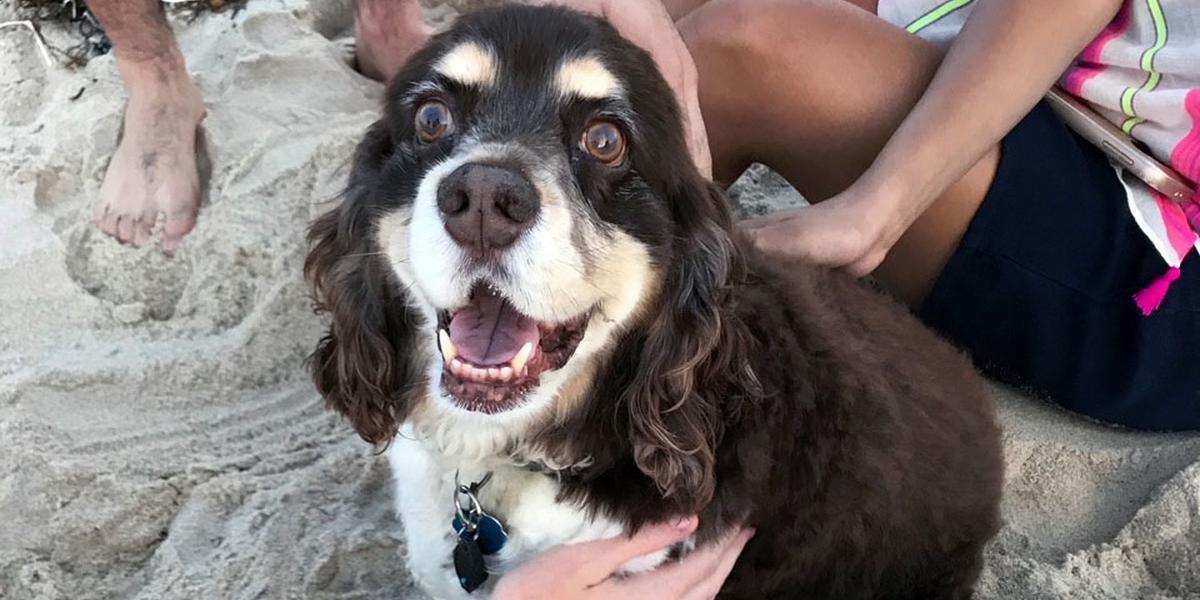Given in memory
In wake of dog’s passing, donor’s gift gives boost to research into aggressive cancer

In wake of dog’s passing, donor’s gift gives boost to research into aggressive cancer
There weren’t many days in his life when Prince the American cocker spaniel wasn’t at Jason Redlus’ side.
As Redlus followed his entrepreneurial instincts and built a seminar and conference management business from the ground up in New York, Prince remained a constant companion through a decade of 100-hour work weeks and traveling.
“He kind of kept me human,” Redlus recalls. “He really made sure I maintained a sense of compassion and empathy in my life because, at that point, I was just working all the time.”
Prince became a mainstay at Redlus’ office, greeting staff and visitors with a friendly demeanor. When Redlus moved on to new entrepreneurial ventures and started a family, Prince was there for it all.
In 2017, it was Redlus’ turn to be there for Prince. A small mast cell tumor was discovered on Prince’s nose, and Redlus wasted no time in seeking treatment. Later in November 2019, a follow-up ultrasound scan uncovered a mass in Prince’s spleen and part of his liver. Further testing revealed the tumor to be hemangiosarcoma (HSA), a type of cancer that develops from the cells that normally create blood vessels.
HSA is notoriously difficult to treat because of its aggressive behavior and rapid progression. It can present throughout the body, but commonly arises in the heart, spleen, and liver. Depending on the location of the cancer, surgery and chemotherapy are treatment options, but only 10 to 15 percent of dogs with HSA survive one year after treatment.
After receiving the news, Redlus began researching the cancer and any institutions that specialize in its treatment. Among his search results was a clinical trial offered through the Clinical Investigation Center at the College of Veterinary Medicine (CVM). The trial focuses on evaluating the use of propranolol, a drug typically used to treat heart disease, in combination with chemotherapy as a treatment for HSA.
Redlus connected with Erin Dickerson, PhD, the trial’s principal investigator, an associate professor in the Department of Veterinary Clinical Sciences, and researcher in the Animal Cancer Care and Research Program. She specializes in oncology and understands the harsh reality of an HSA diagnosis.
“We have tens of thousands of dogs each year that are diagnosed with hemangiosarcoma that don’t survive,” Dickerson says. “Because HSA is basically considered a death sentence by a lot of veterinarians, a lot of dogs are euthanized right away or a treatment isn’t pursued, or dogs are given palliative care, which really doesn’t prolong their life.”
Though Dickerson and Redlus were separated by more than 1,000 miles, he says she took an extraordinary amount of time and care in walking him through options for Prince.
“She was honest, and the amount of communication and explanation that she did so magnanimously was really special,” Redlus says.
Ultimately, Redlus chose not to pursue enrolling Prince in the trial and sought other treatment options closer to home. Prince later passed in May 2020, but his story does not end there. In an effort to further research into HSA, Redlus made a gift to CVM.
His donation, in concert with gifts from other donors, supports Dickerson’s continued research into identifying and defining subtypes of HSA and investigating if any of these subtypes are more responsive to treatment than others.
“Jason’s gift has allowed us to generate what we would call preliminary data for other grant applications and to begin new studies on HSA earlier than we would have,” Dickerson says. “His donation has really helped us to look at some of these other questions that we might not be able to answer otherwise or to even start addressing.”
A head start on research identifying and defining subtypes of HSA could eventually yield targeted treatments that could increase the life expectancy for canine patients diagnosed with certain subtypes, Dickerson theorizes.
For Redlus, the chance to make an impact through a gift that advances research and honors the life of his loyal companion is one he was happy to take.
“We’re all beneficiaries of what came before us. And I think if you have the ability, whether it's through your time or your resources, you ought to pay it forward,” Redlus says. “It’s the right thing to do. If future animals and their owners can benefit from more research and more options, I'm glad to be part of that—the same way people were part of it before me.”
Research is often supported through grant funding, but gifts can have a tremendous impact. Interested in supporting HSA research or other initiatives? Visit our Give webpage to learn more about how you can make a difference.